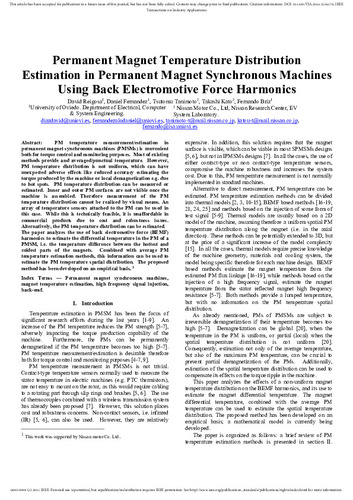Permanent magnet temperature distribution estimation in PMSMs using BEMF harmonics
Autor(es) y otros:
Palabra(s) clave:
Permanent magnet synchronous machines
High frequency signal injection
Magnet temperature estimation
Fecha de publicación:
Editorial:
IEEE
Versión del editor:
Citación:
Resumen:
PM temperature measurement/estimation in permanent magnet synchronous machines (PMSMs) is convenient both for torque control and monitoring purposes. Most of existing methods provide and averaged/punctual temperature. However, PM temperature distribution is not uniform, which can have unexpected adverse effects like reduced accuracy estimating the torque produced by the machine or local demagnetization e.g. due to hot spots. PM temperature distribution can be measured or estimated. Inner and outer PM surfaces are not visible once the machine is assembled. Therefore measurement of the PM temperature distribution cannot be realized by visual means. An array of temperature sensors attached to the PM can be used in this case. While this is technically feasible, it is unaffordable in commercial products due to cost and robustness issues. Alternatively, the PM temperature distribution can be estimated. The paper analyzes the use of back electromotive force (BEMF) harmonics to estimate the differential temperature in the PM of a PMSM, i.e. the temperature difference between the hottest and coldest parts of the magnets. Combined with average PM temperature estimation methods, this information can be used to estimate the PM temperature spatial distribution. The proposed method has been developed on an empirical basis
PM temperature measurement/estimation in permanent magnet synchronous machines (PMSMs) is convenient both for torque control and monitoring purposes. Most of existing methods provide and averaged/punctual temperature. However, PM temperature distribution is not uniform, which can have unexpected adverse effects like reduced accuracy estimating the torque produced by the machine or local demagnetization e.g. due to hot spots. PM temperature distribution can be measured or estimated. Inner and outer PM surfaces are not visible once the machine is assembled. Therefore measurement of the PM temperature distribution cannot be realized by visual means. An array of temperature sensors attached to the PM can be used in this case. While this is technically feasible, it is unaffordable in commercial products due to cost and robustness issues. Alternatively, the PM temperature distribution can be estimated. The paper analyzes the use of back electromotive force (BEMF) harmonics to estimate the differential temperature in the PM of a PMSM, i.e. the temperature difference between the hottest and coldest parts of the magnets. Combined with average PM temperature estimation methods, this information can be used to estimate the PM temperature spatial distribution. The proposed method has been developed on an empirical basis
ISSN:
Colecciones
Ficheros en el ítem




